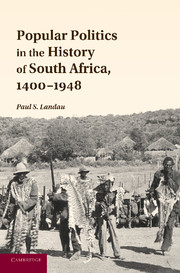Book contents
- Frontmatter
- Contents
- List of Figures
- Preface: The Birth of the Political
- Acknowledgments
- 1 Eyewitness Engagements (Highveld political discourse at the start of the 1800s)
- 2 History before Tribes (Partnership, alliance, and power)
- 3 Translations (Missionaries and the invention of Christianity)
- 4 The Incipient Order (Moroka's reign, 1828–1880)
- 5 Mixed People (The Samuelites, the Griqua, and other subjectivities, 1880–1928)
- 6 Twentieth-Century Tribes
- Primary and Archival Sources
- Bibliography
- Index
- References
6 - Twentieth-Century Tribes
Published online by Cambridge University Press: 04 August 2010
- Frontmatter
- Contents
- List of Figures
- Preface: The Birth of the Political
- Acknowledgments
- 1 Eyewitness Engagements (Highveld political discourse at the start of the 1800s)
- 2 History before Tribes (Partnership, alliance, and power)
- 3 Translations (Missionaries and the invention of Christianity)
- 4 The Incipient Order (Moroka's reign, 1828–1880)
- 5 Mixed People (The Samuelites, the Griqua, and other subjectivities, 1880–1928)
- 6 Twentieth-Century Tribes
- Primary and Archival Sources
- Bibliography
- Index
- References
Summary
Throughout decades of competitive political formulations, from the 1920s onward, the official understanding of popular politics remained fairly elementary. Chiefdoms were seen as natural phenomena. Because the Christians' ideal kingdom was made of what people strove for on earth, Christianity echoed traditional highveld political speech much more closely than government-recognized tribalism. Anthropologists stepped into the breach and labored to learn and catalogue the life of African people, writing their rules of inheritance and civic justice, their habits of labor, their religions. They found complex and multilayered identities within and shared between chiefdoms. At the same time, they framed their results in an ethnic or tribal paradigm, set in an undefinable time. One scholar in particular made a meticulous and broad contribution to knowing the highveld in this way. This chapter appraises his work in the context of contemporaneous popular mobilizations.
Men continued, in crises, to express their commitment to their chief with the ideas, tone, and emphases that Christians long ago laid claim to. Men continued to resort to mobile generational alliances and partnerships in the name of a putative shared ancestor, in pursuit of land and wealth. Such was the basic shape of the historical subjectivity of most South Africans. The Native Affairs Department (NAD) and British imperial officials ham-fistedly kept their understandings of subjectivities in play, treating loyalties as organic affiliations that might somehow remain intact even without real chiefly or public community power.
- Type
- Chapter
- Information
- Popular Politics in the History of South Africa, 1400–1948 , pp. 214 - 250Publisher: Cambridge University PressPrint publication year: 2010



